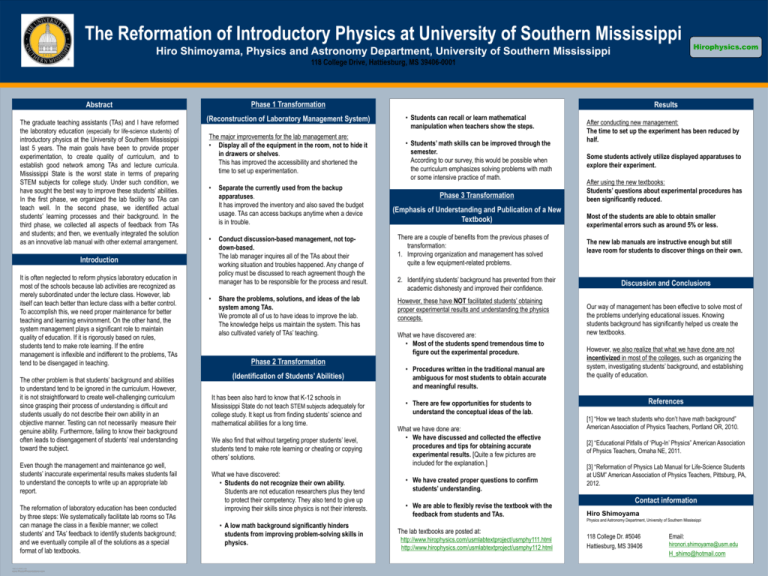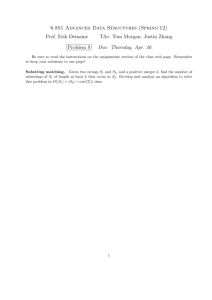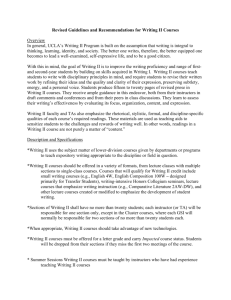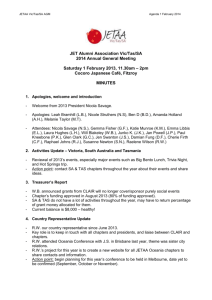48x36 Poster Template
advertisement

The Reformation of Introductory Physics at University of Southern Mississippi Hiro Shimoyama, Physics and Astronomy Department, University of Southern Mississippi Hirophysics.com 118 College Drive, Hattiesburg, MS 39406-0001 Phase 1 Transformation Abstract The graduate teaching assistants (TAs) and I have reformed the laboratory education (especially for life-science students) of introductory physics at the University of Southern Mississippi last 5 years. The main goals have been to provide proper experimentation, to create quality of curriculum, and to establish good network among TAs and lecture curricula. Mississippi State is the worst state in terms of preparing STEM subjects for college study. Under such condition, we have sought the best way to improve these students’ abilities. In the first phase, we organized the lab facility so TAs can teach well. In the second phase, we identified actual students’ learning processes and their background. In the third phase, we collected all aspects of feedback from TAs and students; and then, we eventually integrated the solution as an innovative lab manual with other external arrangement. (Reconstruction of Laboratory Management System) The major improvements for the lab management are: • Display all of the equipment in the room, not to hide it in drawers or shelves. This has improved the accessibility and shortened the time to set up experimentation. • • Introduction It is often neglected to reform physics laboratory education in most of the schools because lab activities are recognized as merely subordinated under the lecture class. However, lab itself can teach better than lecture class with a better control. To accomplish this, we need proper maintenance for better teaching and learning environment. On the other hand, the system management plays a significant role to maintain quality of education. If it is rigorously based on rules, students tend to make rote learning. If the entire management is inflexible and indifferent to the problems, TAs tend to be disengaged in teaching. The other problem is that students’ background and abilities to understand tend to be ignored in the curriculum. However, it is not straightforward to create well-challenging curriculum since grasping their process of understanding is difficult and students usually do not describe their own ability in an objective manner. Testing can not necessarily measure their genuine ability. Furthermore, failing to know their background often leads to disengagement of students’ real understanding toward the subject. Even though the management and maintenance go well, students’ inaccurate experimental results makes students fail to understand the concepts to write up an appropriate lab report. The reformation of laboratory education has been conducted by three steps: We systematically facilitate lab rooms so TAs can manage the class in a flexible manner; we collect students’ and TAs’ feedback to identify students background; and we eventually compile all of the solutions as a special format of lab textbooks. TEMPLATE DESIGN © 2008 www.PosterPresentations.com • Separate the currently used from the backup apparatuses. It has improved the inventory and also saved the budget usage. TAs can access backups anytime when a device is in trouble. Results • Students can recall or learn mathematical manipulation when teachers show the steps. • Students’ math skills can be improved through the semester. According to our survey, this would be possible when the curriculum emphasizes solving problems with math or some intensive practice of math. Phase 3 Transformation (Emphasis of Understanding and Publication of a New Textbook) Conduct discussion-based management, not topdown-based. The lab manager inquires all of the TAs about their working situation and troubles happened. Any change of policy must be discussed to reach agreement though the manager has to be responsible for the process and result. There are a couple of benefits from the previous phases of transformation: 1. Improving organization and management has solved quite a few equipment-related problems. Share the problems, solutions, and ideas of the lab system among TAs. We promote all of us to have ideas to improve the lab. The knowledge helps us maintain the system. This has also cultivated variety of TAs’ teaching. However, these have NOT facilitated students’ obtaining proper experimental results and understanding the physics concepts. Phase 2 Transformation (Identification of Students’ Abilities) It has been also hard to know that K-12 schools in Mississippi State do not teach STEM subjects adequately for college study. It kept us from finding students’ science and mathematical abilities for a long time. We also find that without targeting proper students’ level, students tend to make rote learning or cheating or copying others’ solutions. What we have discovered: • Students do not recognize their own ability. Students are not education researchers plus they tend to protect their competency. They also tend to give up improving their skills since physics is not their interests. • A low math background significantly hinders students from improving problem-solving skills in physics. 2. Identifying students’ background has prevented from their academic dishonesty and improved their confidence. What we have discovered are: • Most of the students spend tremendous time to figure out the experimental procedure. • Procedures written in the traditional manual are ambiguous for most students to obtain accurate and meaningful results. • There are few opportunities for students to understand the conceptual ideas of the lab. What we have done are: • We have discussed and collected the effective procedures and tips for obtaining accurate experimental results. [Quite a few pictures are included for the explanation.] • We have created proper questions to confirm students’ understanding. • We are able to flexibly revise the textbook with the feedback from students and TAs. The lab textbooks are posted at: http://www.hirophysics.com/usmlabtextproject/usmphy111.html http://www.hirophysics.com/usmlabtextproject/usmphy112.html After conducting new management: The time to set up the experiment has been reduced by half. Some students actively utilize displayed apparatuses to explore their experiment. After using the new textbooks: Students’ questions about experimental procedures has been significantly reduced. Most of the students are able to obtain smaller experimental errors such as around 5% or less. The new lab manuals are instructive enough but still leave room for students to discover things on their own. Discussion and Conclusions Our way of management has been effective to solve most of the problems underlying educational issues. Knowing students background has significantly helped us create the new textbooks. However, we also realize that what we have done are not incentivized in most of the colleges, such as organizing the system, investigating students’ background, and establishing the quality of education. References [1] “How we teach students who don’t have math background” American Association of Physics Teachers, Portland OR, 2010. [2] “Educational Pitfalls of ‘Plug-In’ Physics” American Association of Physics Teachers, Omaha NE, 2011. [3] “Reformation of Physics Lab Manual for Life-Science Students at USM” American Association of Physics Teachers, Pittsburg, PA, 2012. Contact information Hiro Shimoyama Physics and Astronomy Department, University of Southern Mississippi 118 College Dr. #5046 Hattiesburg, MS 39406 Email: hironori.shimoyama@usm.edu H_shimo@hotmail.com



